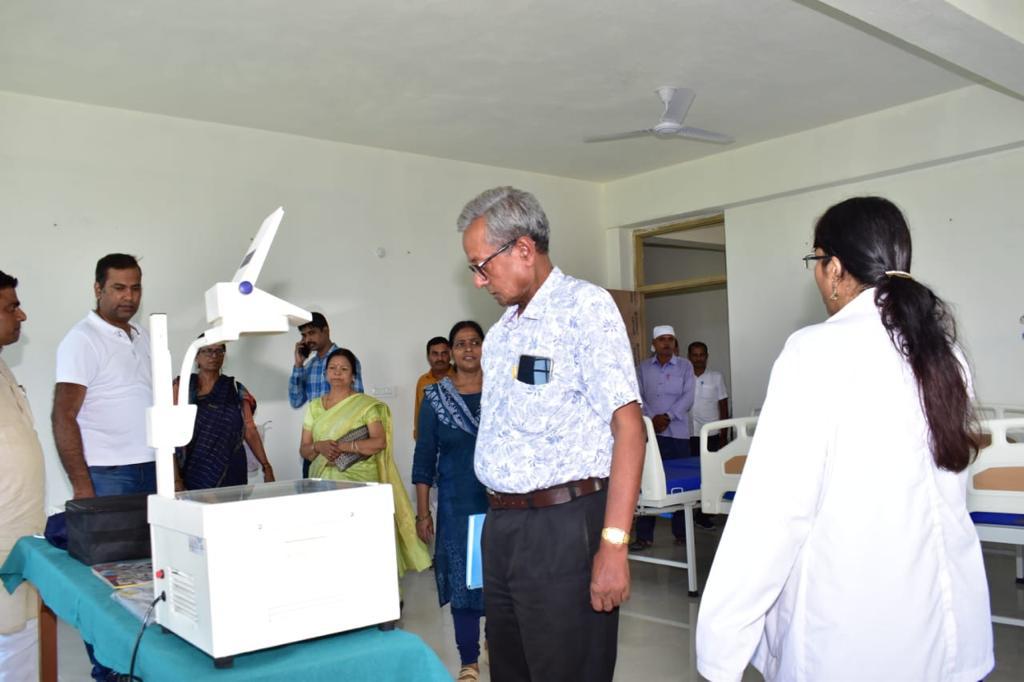B.Pharma
At RSRGOI we Provide best education in Bachelor of Pharmacy (B.Pharma) Which is an undergraduate degree course that covers the study of drugs, medicines, and pharmaceutical sciences. It is a popular choice for science students after 12th grade. Bachelor of Pharmacy (B.Pharma) is a four-year undergraduate program that provides comprehensive education and training in the field of pharmacy. It is designed for individuals aiming to pursue a career in pharmaceutical sciences, healthcare, or related industries.
Course duration
The course is four years long and has eight semesters of theoretical and practical training.
Curriculum
The course covers a wide range of subjects, including core and elective studies. It includes the study of pharmaceutical engineering, medicinal chemistry, and more.
(B.Pharma) is a crucial program in the field of healthcare and pharmaceuticals. Its importance extends across various dimensions, from individual career development to broader societal impact. Here’s a detailed look at why a B.Pharma degree is significant:
- Foundation for a Career in Pharmacy
Professional Preparation: B.Pharma provides the foundational knowledge and skills required to become a licensed pharmacist or to work in various roles within the pharmaceutical industry.
Career Opportunities: Graduates can pursue diverse career paths including community pharmacy, hospital pharmacy, pharmaceutical research, and pharmaceutical sales.
- Key Role in Healthcare
Medication Management: Pharmacists play a critical role in ensuring that patients receive the correct medications, dosages, and instructions for use, which is essential for effective treatment and patient safety.
Patient Counseling: Pharmacists provide crucial information to patients about their medications, including potential side effects, interactions with other drugs, and proper usage, which contributes to better health outcomes.
- Contribution to Drug Development and Innovation
Research and Development: B.Pharma graduates are involved in drug development, including the discovery of new drugs, formulation, and testing. This contributes to advancing medical treatments and improving health care.
Quality Control: Ensuring the quality, safety, and efficacy of pharmaceuticals through rigorous testing and quality control processes is a key responsibility for those in the industry.
- Support for Public Health
Health Promotion: Pharmacists often engage in public health initiatives, including vaccination programs, health screenings, and educational campaigns to promote wellness and prevent diseases.
Disease Management: By providing medication management and advice, pharmacists help in managing chronic conditions like diabetes, hypertension, and asthma.
- Regulatory and Compliance Role
Drug Regulations: Pharmacists ensure compliance with drug laws and regulations, safeguarding public health by maintaining high standards for drug manufacturing and distribution.
Ethical Practice: The B.Pharma program emphasizes ethical practices in pharmacy, ensuring that graduates adhere to professional and legal standards.
- Practical and Clinical Skills
Laboratory and Clinical Training: The program includes practical training in pharmaceutical labs and clinical settings, helping students develop hands-on skills essential for their professional roles.
Clinical Experience: Exposure to clinical environments prepares graduates to work effectively in hospitals and other healthcare facilities, interacting with patients and healthcare teams.
- Career Advancement and Specialization
Further Education: A B.Pharma degree serves as a stepping stone for advanced studies, such as a Master of Pharmacy (M.Pharma), Ph.D., or specialized certifications in areas like clinical pharmacy or drug regulatory affairs.
Professional Growth: The degree opens opportunities for career advancement in specialized fields, including research, regulatory affairs, and healthcare management.
- Economic Impact
Employment Generation: The pharmaceutical industry is a significant sector that contributes to job creation. B.Pharma graduates find employment in various settings, including retail pharmacies, hospitals, pharmaceutical companies, and regulatory agencies.
Healthcare Costs: By managing medications and providing patient education, pharmacists help reduce healthcare costs through effective drug therapy and disease management.
- Personal and Professional Development
Skill Development: The B.Pharma program helps students develop a range of skills, including technical proficiency, analytical thinking, communication, and problem-solving abilities.
Ethical and Professional Standards: Graduates are trained to uphold high ethical and professional standards, which is crucial for maintaining public trust and ensuring quality care.
- Community Impact
Accessibility of Care: Pharmacists increase the accessibility of healthcare services by providing essential medications and health advice in community settings.
Support for Healthcare Teams: Pharmacists collaborate with doctors, nurses, and other healthcare professionals, contributing to a holistic approach to patient care.
It is a vital educational program that prepares individuals for a rewarding career in pharmacy and related fields. It plays a crucial role in healthcare by ensuring effective medication management, supporting public health initiatives, and contributing to drug development and innovation. The skills and knowledge gained through a B.Pharma program enable graduates to make significant impacts in their professional roles, advance their careers, and contribute positively to society.
After completing a Bachelor of Pharmacy (B.Pharma), graduates have a wide array of career opportunities available to them in the pharmaceutical and healthcare industries. Here’s a detailed look at potential career paths and options for further specialization:
Community Pharmacist
Role: Dispense medications, provide patient counseling, manage over-the-counter drugs, and offer health advice in retail pharmacy settings.
Skills: Customer service, drug knowledge, and patient interaction.
Hospital Pharmacist
Role: Manage and dispense medications within hospitals, work closely with healthcare teams to optimize patient care, and monitor patient drug therapy.
Skills: Clinical skills, teamwork, and critical thinking.
Clinical Pharmacist
Role: Work directly with healthcare providers to develop and manage medication therapy plans for patients, often in specialized areas like oncology or cardiology.
Skills: Clinical assessment, medication management, and therapeutic decision-making.
Students can grow carrier in Pharmaceutical Industry :
Quality Control and Assurance
Role: Ensure the quality and safety of pharmaceutical products through testing and regulatory compliance.
Skills: Attention to detail, analytical skills, and regulatory knowledge.
Pharmaceutical Sales and Marketing
Role: Promote and sell pharmaceutical products to healthcare professionals and institutions.
Skills: Sales skills, product knowledge, and communication.
Regulatory Affairs Specialist
Role: Ensure that pharmaceutical products comply with regulations and standards set by regulatory agencies. Prepare and submit regulatory documents for drug approval.
Skills: Knowledge of regulatory processes, attention to detail, and communication.
Clinical Research Associate
Role: Monitor and manage clinical trials, ensure compliance with study protocols, and analyze data.
Skills: Research management, data analysis, and regulatory knowledge.
Pharmacy Educator
Role: Teach pharmaceutical sciences and pharmacy practice at educational institutions or conduct workshops and training.
Skills: Teaching, communication, and subject expertise.
Hospital Administration
Role: Manage pharmacy departments within hospitals, oversee medication distribution, and handle administrative tasks related to pharmaceutical services.
Skills: Management, organizational skills, and knowledge of healthcare systems.
Consultant Pharmacist
Role: Provide expert advice on medication management to healthcare providers, institutions, or individuals.
Skills: Specialized knowledge in therapeutic areas, consultancy skills, and problem-solving.
Pharmaceutical Manufacturing
Role: Work in the production and manufacturing of pharmaceutical products, including drug formulation, production, and process improvement.
Skills: Manufacturing processes, quality control, and technical expertise.
Government and Regulatory Bodies
Role: Work with government agencies or regulatory bodies to help shape and enforce drug policies, conduct inspections, and ensure compliance with health regulations.
Skills: Regulatory knowledge, policy understanding, and communication.
Further Education and Specialization
Master of Pharmacy (M.Pharma)
Role: Specialize in areas such as clinical pharmacy, pharmaceutical technology, or industrial pharmacy. Open doors to advanced positions in research and development.
Ph.D. in Pharmacy
Role: Engage in advanced research, academic careers, or high-level positions in pharmaceutical companies.
Specialized Certifications
Role: Obtain certifications in areas such as clinical pharmacology, pharmacovigilance, or drug regulatory affairs to enhance expertise and career prospects.
Entrepreneurship
Role: Start your own pharmacy, pharmaceutical consultancy, or related business.
Skills: Business management, financial planning, and market knowledge.
Non-Traditional Roles
Health Informatics: Use technology to manage and analyze health data.
Medical Writing: Write and edit scientific documents, research papers, and regulatory submissions.
Public Health: Work on community health programs, policy-making, or health promotion initiatives.
Overall The Bachelor of Pharmacy degree offers a versatile foundation that opens numerous career opportunities in various sectors. Whether working directly with patients, engaging in research, or contributing to the pharmaceutical industry, B.Pharma graduates have the potential to make significant impacts in healthcare. Additionally, pursuing further education or specialized certifications can enhance career prospects and provide opportunities for advancement in specialized areas.



